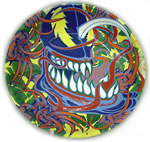 |
Suzan Batu
"Big Blue Monster"
enamel on plastic
18" x 18"
(click on image for larger view)
|
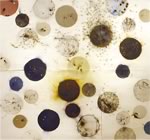 |
Rosemarie Fiore
"Firework Drawing"
exploded fireworks on paper
88.5" x 82"
(click on image for larger view)
|
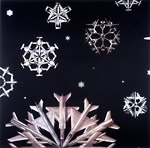 |
Michael Oatman
"Small Blanket"
collage on paper
391/2" x 40"
(click on image for larger view)
|
 |
Susan Graham
"Sugar Approximation-Browning Semiautomatic Pistol (Yellow)"
sugar, egg whites, resin, wood, paint, plexi.
6" x 15" x 8"
(click on image for larger view)
|
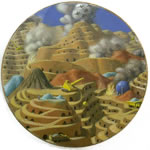 |
William Stahl
"Feeding the Republic"
oil on copper
6" x 6"
(click on image for larger view)
|
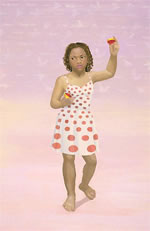 |
Judith Rafael
"Pandora Caught (Red Handed)"
acrylic on panel
42" x 28"
(click on image for larger view)
|
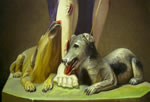 |
Limor Gasko
"Dogs with Saint"
oil on linen
12" x 8"
(click on image for larger view)
|
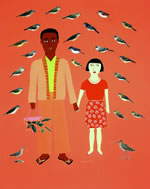 |
Lucy Fradkin
"Mixed Emotions"
acrylic, gouache, collage,
pencil on paper
(click on image for larger view)
|
|
The eight artists in War and Peace address concepts of strife and utopia with
a subtlety and complexity that avoids polemic while providing a challenging
response to the present war. Four of the artists ambiguously explore the
seductive qualities of war's weapons and power. Suzan Batu, originally from Turkey,
is known for her previous work of painted abstractions of delicate arabic
calligraphy imbued with a pop sensibility. Here she presents new works on canvas,
bowls and platters. Inspired by Turkish pottery designs, her flowers and
patterns morph into long tongued and sharp toothed demons who seem intent on
gobbling up the world. Conceptual artist, Rosemarie Fiore is presenting her large
scale gun powder and pigment works on paper which are made by exploding fire
works inside cardboard tubes. The colorful spheres with their halos and
particles allude to images of the cosmos and were inspired by the shocking and awful
beauty of the bombs exploding over Baghdad. The fireworks themselves, like
mini bombs, cause great concussions, sparks, and smoke in the creation of these
works. Michael Oatman, an obsessive collagist, is here presenting his piece
"Small Blanket" which appears at first to be a nighttime sky filled with
snowflakes until upon closer inspection the flakes are revealed to be made up of
dozens of war planes fashioned into mandala like patterns. The term blanket here
puns on snow, security, and the Pentagon's favored bombing strategy. Susan
Graham makes replicas of army pistols out of sugar and lacy porcelain reinforcing
their role as objects of desire and yet subverting their usefulness as tools
of violence. William Stahl's richly detailed and jewel colored paintings on
copper depict tiny landscapes in the process of being conquered and pillaged.
Judith Raphael who is known for her paintings of girls in the poses of classical
mythology is here presenting the iconic image "Pandora/Caught Red-handed", of
a young girl wielding an open red box surrounded by war planes. Her modern
Pandora mimics Roman sculpture and forebodes our own rashness as a culture in
opening the Pandora's Box of war. Limor Gasko who paints figurines, silk birds
and kitsch statues with the liveliness and sympathy of portraiture, here
presents softly lit new icons alluding to Mexican retablos. "Dog with Saint" a
poignant image of a saint who's bloodied wounds are being licked points to a
gentle and healing alternative to our present international adventures. Lucy
Fradkin mimics the naive frontal drawing style of the self taught sign painters
she admires. Her charming large works on paper present idyllic images of
interracial couples surrounded by birds in a utopian vision of a future where we "can
all just get along".
Tolstoy's philosophical doctrine of non-violence, had a profound influence on
Mahatma Gandhi and Martin Luther King encouraging pacifism as a political
tool for social change. Then as now, political wisdom scorned pacifism as
unsuccessful and dangerous and peace crusaders were vilified as utopians and threats
to national security. For Tolstoy, generals and kings delude themselves when
they presume they determine the outcome of battles or the courses taken by
nations. He contended that personal events are more profound than public ones. In
War and Peace Tolstoy turns the romanticized concept of war as glory on its
head. He begins the book with the build up toward war depicting its uniformed
parades and pomp, and then slowly and subtly describes the unraveling of the
heroic with a realistic view of battle as unglamorous actions performed by
ordinary men.
|
|

